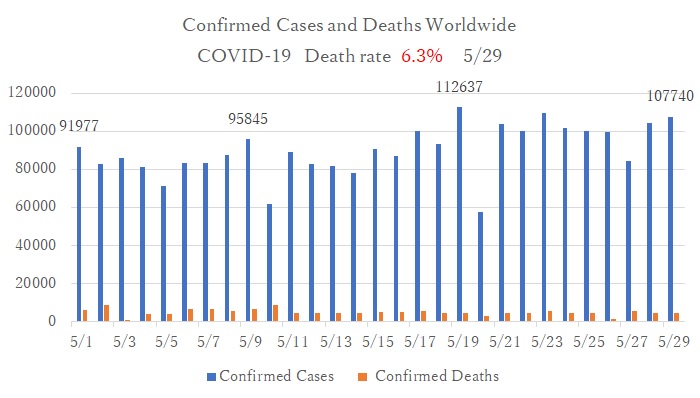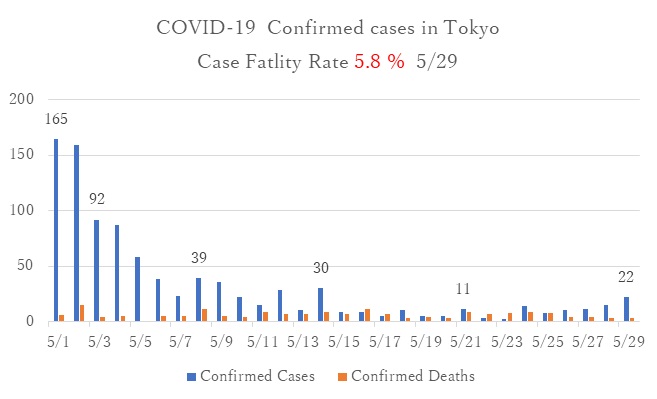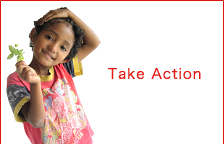SHARE
Services for the Health in Asian & African Regions (SHARE) = SHARE is a citizen sector organization (NGO) that engages in international cooperation mainly through providing health service.
HOME > News > Information of COVID-19(9)
- 【※updated】COVID-19(multi-language)
- Information of COVID-19(15)
- Information of COVID-19(vaccines)
- 《Request to the Government of Japan》Ease the protection of intellectual property rights and promote sharing and cooperating on pharmaceuticals and medical technologies, in order to accelerate efforts to overcome COVID-19 all over the world.
- Information of COVID-19(14)
- Information of COVID-19(13)
- Information of COVID-19(12)
- Information of COVID-19(11)
- SHARE Medical Information Line for Migrants is resumed in Oct.
- Information of COVID-19(10)
Information of COVID-19(9)

Information of COVID-19 (9)by SHARE 2020.06.02
1.Global and Japanese Situation of COVID-19
Confirmed cases of COVID-19 worldwide according to reports by WHO Update 2020/5/29 (Japan Standard Time) :
- Globally, the number of daily confirmed cases is increasing. The pandemic continues in Russia, Brazil, and India. The number of daily confirmed cases is increasing in South Asian countries such as Pakistan and Bangladesh; South America, the Mediterranean, and middle eastern countries, such as Saudi Arabia and Quate. Infection among migrant workers in the middle east accounts for most of the cases.
- In Europe, while the number of daily confirmed cases decreased, the governments in Europe began gradually easing lockdown restrictions. The fear now is of these actions triggering a second wave of COVID-19.
- In the Southeast Asian region, the rate of increase continues to slow down.
Tokyo Prefecture Report 5/29

- Although the state of emergency was lifted on May 25th, the daily confirmed cases are showing a gradual increase. Clusters are developing at medical facilities in Ehime, Hokkaido, and Kitakyusyu in Fukuoka prefecture.
2.Return to work guidelines for patients with mild confirmed or suspected cases
- Mild confirmed cases that are diagnosed by a responsible medical facility or public health center, and 14 days after starting isolation and/or quarantine at designated facilities or homes. If the patients are determined to be able to return to normal daily life, he or she may return to work.
- Mild suspected cases (e.g., the person who had a fever or flu symptoms, but undiagnosed with COVID19) can end self-isolation eight days after the onset of symptoms AND must experience a resolution of fever or other symptoms for at least three days without medication (Japan Society for Occupational Health).
- The workplaces need to welcome their employee who has recovered from COVID19. The employer should not require the certificate of virus-free or recovery from the disease because it is complicated to diagnose virus-free status. Also, public health centers need to focus on diagnosing newly confirmed cases rather than proving the recovery of the patients.
- Moreover, the accuracy of self-testing kits for COVID19 falls behind that of PCR testing at the lab. The physician cannot and will not be responsible for the results of self-testing kits.
- The Act on the Prevention of Infectious Diseases and Medical Care for Patients with Infectious Diseases stipulates for patients to refrain from working. Some employers who provide social welfare services (e.g., nursery, care home) may want to announce their employee's status of virus-free for their client's comfort. However, they should be aware that "anyone could be infected," and "anyone can infect without noticing." Therefore, the employer must restrict suspected cases from their work, and encourage them to rest at home. This is proper infection control in workplaces.
Reference:
・https://note.stopcovid19.jp/n/n74204fb1d5f1
・https://note.stopcovid19.jp/n/nbc124bd1d18b#qsZJf
・https://www.mhlw.go.jp/content/000618525.pdf
・https://www.sanei.or.jp/images/contents/416/COVID-19guide0511koukai.pdf
・https://www.ecdc.europa.eu/sites/default/files/documents/covid-19-guidance-discharge-and-ending-isolation-first%20update.pdf
3.Who are eligible to receive coronavirus economic response package?
- On April 20th, coronavirus economic response package was approved by the cabinet decision.
- Foreign residents who are listed on the country's Basic Resident Registration as of April 27th are eligible to receive the 100,000 yen as part of its coronavirus economic response package.
- Basic Resident Registration is based on possessing a residence certificate with name, date of birth, sex, and address. If foreign residents with a residence card move into town, they must register into the designated municipality.
- Among foreign residents who are not listed on the country's Basic Resident Registration as of April 27th, if they were not able to return to their home country (e.g., former trainee, former students), or are the children of those who are applying for refugee status, they are eligible to receive this economic response package. Those who hold short stay status or status with designated activities for a three-month shall apply for the status with designated activities for six-months and need to register in Basic Resident Registration (as of May 19th).
- Foreign people who stay for a short term for sightseeing or business, those who overstay in Japan without visiting visa, are not eligible to receive this package.
- The municipality where you are registered will send an application form to the head of every registered household. The head of the household has to fill out their name, date of birth, address, and bank account number, and application bank account, and send the applications back with copies of their ID and bank account information.
- The link below explains how to fill out the application form in multiple languages.
http://www.ne.jp/asahi/rink/rink/index.html - Those have a My Number Card (Individual Number Card) can apply on the website.
Reference:
・https://kyufukin.soumu.go.jp/en/
・https://www3.nhk.or.jp/nhkworld/en/news/backstories/1057/
・https://migrants.jp/news/office/20200520.html
Written by Nakasa T, MD, Co-President of SHARE
Koto K, RN, SHARE advisor
Koto K, RN, SHARE advisor
■English Information
-
Information of COVID-19(1)(ENGLISH)
-
Information of COVID-19(2)(ENGLISH)
-
Information of COVID-19(3)(ENGLISH)
-
Information of COVID-19(4)(ENGLISH)
-
Information of COVID-19(5)(ENGLISH)
-
Information of COVID-19(6)(ENGLISH)
-
Information of COVID-19(7)(ENGLISH)
-
Information of COVID-19(8)(ENGLISH)
-
Information of COVID-19(9)(ENGLISH)
■Useful URLs by multi-languages




